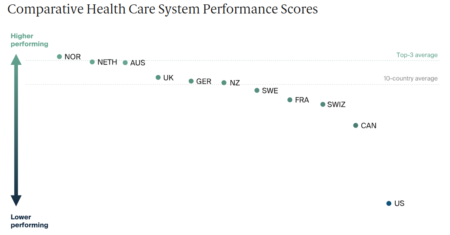CVS pay raise, Lyme shot coming soon, US healthcare woes, and more
05 Aug 2021
Posted by Andrew Kantor
There’s room on the gravy train
Hot on the heels of Aduhelm, Eli Lilly now says it hopes its Alzheimer’s drug will get FDA approval by the end of the year. It’s chief scientific officer, though, said, “There will be some physicians, I’m sure as are today, who still say ‘I don’t want to use a drug until I have cognitive data’.” Indeed.
A Lyme shot could be coming
Human clinical trials are underway for Lyme PrEP — an annual antibody shot against Lyme disease.
[It] delivers a single anti-Lyme antibody directly to a person rather than triggering the patient’s own immune system to make many antibodies, as vaccines do. It is designed to be a seasonal shot that people can get once a year before tick season begins in April.
Unlike a vaccine, Lyme PrEP delivers a single antibody that’s designed to last about nine months with minimal side effects. “If all goes well, Lyme PrEP could become available to the public in 2023 or 2024.”
Meet Big Mike
He’ll be your well-armed guide at Ready. Aim. Phire! on Friday, September 24, so come and say Hi! Then enjoy an afternoon of outside adventure, some (friendly) competition, and the natural beauty of one of Georgia’s finest sporting clays courses. And shoot things.

Some Covid answers
And by answers we mean “what the latest evidence seems to show.”
Labor Day approval: The FDA says it expects to give full approval to Pfizer’s vaccine by Labor Day.
Long Covid appears to be rare in children (according to a study out of King’s College London): “Fewer than one in 20 experienced symptoms for four weeks or more, while only one in fifty had symptoms lasting more than eight weeks.”
Vaccine effectiveness Another British study confirms earlier Israeli data, that two doses of the Pfizer or Moderna vaccines are only about 49% effective against infection from Delta — but 90+% effective against serious illness.
One in 26. That’s the chance of being infected with Covid-19 if you’re in contact with an infected individual and fully vaccinated, the researchers found. This is compared to a one in 13 chance for the unvaccinated.
What are the odds? That same study found that your chance of catching Covid-19 after being in contact with an infected person is 7.23% if you’re unvaccinated, and 3.84% if you’ve had your shots.
Looking up again
Once again, U.S. healthcare is ranked last among the world’s 11 highest-income nations by the annual Commonwealth Fund report. We’re last in access and equity (not surprising), but we’re also last in “Health care outcomes” (we have the highest level of “avoidable mortality”).
The only area we do well in (#2, in fact) is “Care process” — that is, “measures of preventive care, safe care, coordinated care, and engagement and patient preferences,” for everything from mammographies to flu shots to medical errors.
As with everything else it seems, Norway is ranked #1.

Is it time for sticks instead of carrots?
What if (asks a story from Kaiser Health News) health insurers started making unvaccinated people pay more for Covid treatment? The companies have already started removing co-pay waivers, so hospitalization can be expensive even for the insured.
And there is precedent. Already, some policies won’t cover treatment necessitated by what insurance companies deem risky behavior, such as scuba diving and rock climbing.
“If patients thought about the price they might need to pay for their own care,” they suggest, “maybe they would reconsider remaining unprotected.”
Humira downs and ups
Abbvie’s Humira’s international sales have been dropping, but in the U.S. they continue to grow. What’s up — are we just more inflamed over here?
Nope. Abbvie paid biosimilar makers not to enter the U.S. market, so it could keep its monopoly, while those biosimilars entered the European market in October 2018.
Living wage
CVS will raise its minimum wage from $11 an hour to $15 an hour starting next summer. That is all.
Today’s “promising new Covid treatment”
It’s from the Nigella sativa plant, found in parts of eastern Europe and southern Asia and a long-time “traditional remedy.” Aussie researchers think an ingredient in its seeds, thymoquinone, “can stick to the Covid-19 virus spike protein and stop the virus from causing a lung infection.”
And why not — it’s practically a miracle cure:
Nigella Sativa has been shown to be helpful in treating high blood pressure, high cholesterol and diabetes mellitus. As an anti-inflammatory treatment, Nigella Sativa has also been found to help patients with allergic rhinitis and sinusitis, eczema, osteoarthritis and childhood epilepsy.
Liquid delivery
Australian neurologists have created a new way to deliver stem cells to the brain as a way to treat Parkinson’s and other neurological conditions.
The stem cells, along with a “growth-enabling protein” called GDNF, can repair or replace damaged dopamine-producing neurons. The problem was getting them into the brain, and this new hydrogel is meant to solve that.
“When we shake or apply energy to the hydrogel, the substance turns into a liquid which allows us to inject it into the brain through a very small capillary using a needle. Once inside the brain, the gel returns to its solid form.”
The Long Read: Booster edition
So, what’s the latest? “Momentum around booster shots is building in some countries. Does the U.S. need them?“


